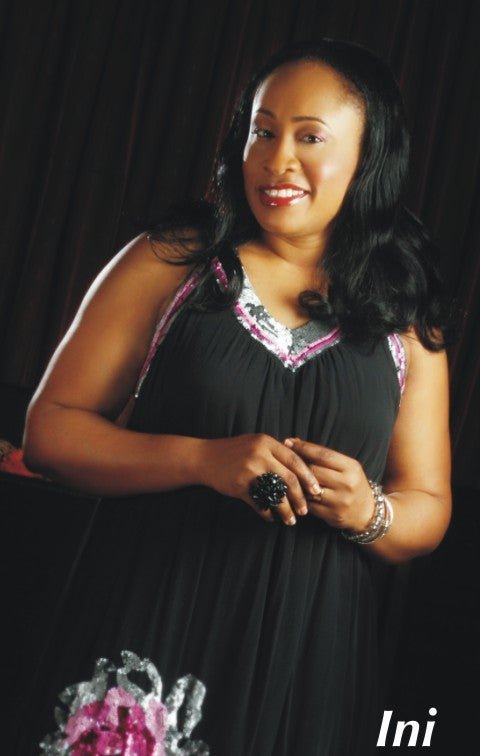Women need to increase in professionalism— Ini Onuk
 If you as a woman were asked to count the stars on your crown that tell the story of each woman you have helped to come up the ladder, how many stars would you have on your crown?. . . This powerful question was posed to me by Ini Onuk, Executive Secretary of WIMBIZ (Women in Management and Business), during the recent interview she granted me.
If you as a woman were asked to count the stars on your crown that tell the story of each woman you have helped to come up the ladder, how many stars would you have on your crown?. . . This powerful question was posed to me by Ini Onuk, Executive Secretary of WIMBIZ (Women in Management and Business), during the recent interview she granted me.
WIMBIZ was formed to encourage and facilitate the interaction between women corporate executives and entrepreneurs. The organization’s overriding vision is “to be a catalyst that elevates the profile of women in management and business.” This vision was born out of a desire to assist women in dealing with the manifold challenges they face in the workplace. WIMBIZ seeks to enable women in business to fulfill their potential and be meaningful contributors to economic development. They also aim at improving the success rate of female entrepreneurs and increasing the proportion of women in senior positions in corporate organizations.
As Executive Secretary, Ini Onuk oversees the formulation of overall policies, strategies, plans and budgets; advises the Board of Trustees and carries responsibility to deliver the WIMBIZ vision.
Ini is an excellent speaker, passionately authentic, willing to tell her story. She is also the author of two books: The Eagle’s Dance (2010), in which she uses her own “painful and almost intolerable” early experiences to show that each of us can be an eagle by “persever[ing] through all odds” and the soon-to-be-released Break the Alabaster: Release the Fragrance, reflections about “the woman and all her gifting.”
I am grateful for organizations like WIMBIZ and courageous women like Ini. I share their goal of advocating for gender equality. This week, I invite you to join me in learning from Ini about the valuable work WIMBIZ is doing.
What are some major challenges women currently face in the workplace?
First, despite the equal intake of women and men at the entry level of most organizations, very few women make it to the top. The glass ceiling is a reality. Organizations may not actively discriminate against women, but they do not adequately understand or address the challenges that women face at work. The result is the loss of a critical highly skilled portion of the workforce.
We also have to deal with a patriarchal society that still sees women more as wives and mothers and small time business owners than as a strong economic and governance force.
Can you give us some specific examples of issues that organizations are not adequately addressing?
Yes. In the past several years we have met with several CEOs and other policy makers to hear directly what they thought to be the critical issues for women in management and business. We also hold periodic meetings to discuss solutions. One key need women have is to be able to work flexi-hours. Another is for daycare facilities within organizations. A third is additional opportunities for training.
From your perspective, what training do business women seem to need most?
I’ll say Leadership and Corporate Governance; for small businesses, Finance Management, and Entrepreneurial Skills. Most women-owned businesses are unable to access funds for bigger business opportunities as they grow, because the women who started them did not understand the importance of putting proper structures in place from the word go.
Also, women need to increase in professionalism. If you are at home, be at hometry not to bring work home. If you are at work, try to ensure that you give your best at it. And do away with being overly emotional in the workplace. Men respect intelligent women who know how to be professional and not sentimental.
Has WIMBIZ been able to offer any training opportunities?
So far, we have partnered with Fate Foundation on trainings for women entrepreneurs. Plans are currently underway for our leadership training series early next year. Of course, we hold our Annual Conference, and we have established a mentoring program that provides informal training at an individual level.
With a view to increasing our ability to offer more for women, WIMBIZ cooperates with other women’s organizations. We are the Nigeria hub for the Africa Business Women Network (ABWN). The ABWN seeks to link businesswomen’s associations in several African countriesNigeria, Kenya, South Africa, Cameroon, Ghana and Ugandato raise the profile of women in the private sector, highlight women’s contributions to economic development, and provide global networking opportunities through the Vital Voices Global Leadership Network. In addition, ABWN member organizations participate in the Corporate Ambassadors Program, which brings the world’s most powerful business women to Africa to do training and networking.
Can you give a recent example of an event ABWN put on for the Corporate Ambassadors Program?
In November 2009, ABWN provided us with Corporate Ambassador Kathy Reiffenstein to attend the Annual Conference/Corporate Ambassadors Programme. We also had a few international business women attending from the U.S. and Ghana. We hope to increase that number this year, as ABWN recently linked up with NAWBO (National Association of Women Business Owners) in the U.S. We are eager to explore new opportunities.
These young girls can learn to focus on the bigger picture.
How can a woman maintain work/life balance as her career and family grow?
This is an ever-present question. We have used it as one of our Roundtable discussion topics. We have also addressed this issue of maintaining balance under themes like “Sustaining Success,” “The A-Z of Self Development” and “Empowered or overpowered?”
Personally, I think you can never really balance things 50/50, but women are good at juggling. We can and do juggle responsibilities of work and home. We must give the best we can where we are at any given point in time.
What do men need to understand, and what can they do to support their women to success?
It is extremely important for every woman that the man in her life supports her vision, her dream, her ambition. A woman who has the support of her partner/spouse is easy to recognize because she is all out and ready to conquer the world. Once a man realizes that the woman’s success is not in competition with his, life becomes easier for both of them.
On the other hand, I have heard a lot of women say your partner/spouse is key to a woman’s success and I could not agree less. Women need to know that getting to the helm of their careers is determined by the level of their aspirations.
What will help women to break through the “glass ceiling”?
Hard work. . . . Focused self development. . . . Professional restraint of emotions in the workplace. . . . Resilience. . . .Taking risks; for example, being willing to consider riskier and unconventional positions.
What do you mean by riskier and unconventional positions?
Very few women would be seen as being able to work on an oil rig or to become the head of a shipping council, for instance. We also need more women in construction, real estate and other related industries.
Can you give an example of women who are finding success in the workplace by taking on this type of position?
Yes. More and more women are now owners of fishing trawlers.
Do you have any parting words to offer to women in the workplace?
Gender mainstreaming, even though loudly talked about, is still not going to happen if we don’t get up and make it happen. We have to work twice as hard to get what we want and where we want to go. So we must clearly define our desires and our valuesand then chart a clear path. And let me say, practically
If you as a woman were asked to count the stars on your crown that tell the story of each woman you have helped to come up the ladder, how many stars would you have on your crown?
It was Madeline Albright who said, “There is a special place in hell for women who do not help other women. Strong words to consider! Thanks to you, Ini, and to the women of WIMBIZ for joining together to help women “come up the ladder” to success. Your work is an inspiration!

